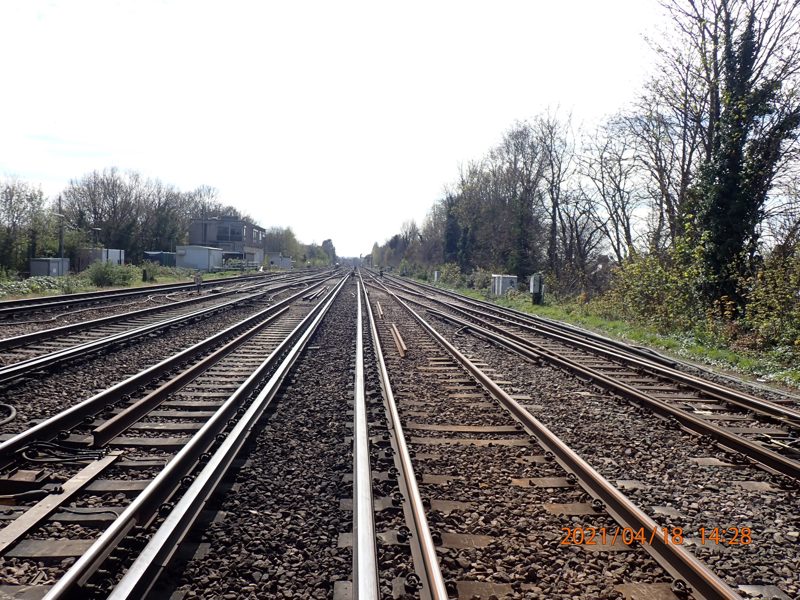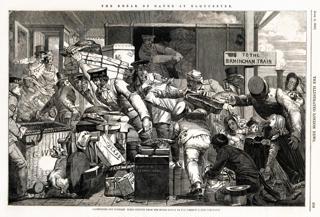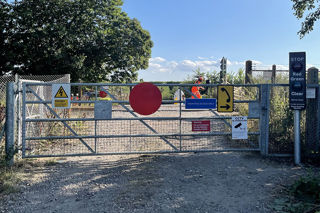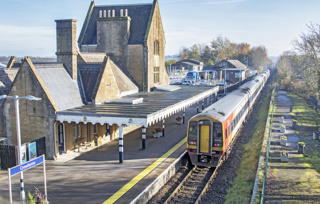
Network Rail has been fined £3.41 million over the death of a track worker at Surbiton in February 2021.

Network Rail has been fined £3.41 million over the death of a track worker at Surbiton in February 2021.
Tyler Byrne was killed on February 9 2021 when he was struck by a South Western Railway train travelling at 76mph on the Down fast. The 30-year-old was with three colleagues carrying out weekly basic visual inspections of switches and crossings when he died.
After previously pleading guilty to failing to ensure the health, safety and welfare of its employees, Network Rail (NR) was sentenced at Kingston Crown Court on February 27, 13 days after it was fined £3.75m over the deaths of two track workers at Margam in July 2019.
His Honour Judge Martyn Barklem listened to submissions on behalf of both the Office of Rail and Road (ORR) and Network Rail (NR) on February 21 before he adjourned the case for six days to consider what fine should be imposed.
The court heard how Byrne was acting as Controller of Site Safety and lead patroller on the day he died, as well as mentoring a colleague. The team of four he was part of was working under the ‘unassisted lookout working’ system at the time. Byrne was walking with his back to the train that hit him and, despite the driver sounding the horn, none of the group appeared to have heard it.
The court heard that Byrne was in the 10-foot between the Up and Down fast lines, but in the four-foot of the crossover between the two, leaving him closer to the Down fast. He was then struck by a Class 159 on a London Waterloo-Salisbury service.
Prosecutor Christine Agnew said track safety concerns were known to Network Rail and an Office of Rail and Road inspection programme found the revised standard 019 (which defines the process to keep those on track safe) “appeared to have little direct positive impact on track worker safety”.
She said: “A lot of work was still being done by defaulting to unassisted lookout protection and human errors continued to happen. It was recommended that working with lookouts should only be done when absolutely necessary and the safe system of work needs to be clear to all, correctly implemented, monitored and safe,” Agnew told the court.
She added that evidence suggested NR’s approach to having lookouts on both directions was “that it would have been difficult, more time consuming and not required by NR standards”, but the Crown’s position was it would have been “reasonably practicable” to make other arrangements such as patrolling when trains were not running.
“Changes implemented by NR following the incident demonstrate change was possible, and that it was reasonably practicable for them to have done more to reduce the risk and done it sooner,” she said.

“The use of warning systems and in particular unassisted lookout warning systems was greatly reduced after the incident and a safe system of work was introduced for the inspection of crossovers.”
She concluded: “There were not at the time of Tyler Byrne’s death effective health and safety procedures in place. There was no warning for trains travelling in both up and down directions. No one had recognised and acted upon the risk that someone could be in the path of a train whilst following the version of the track patrol diagram that was in place at the time of the incident.
“NR standards and handbooks did not define methodologies for inspection of crossovers between two fast lines. There were clear variations between staff in understanding what was required when inspecting switches and crossings and no monitoring or supervision of the patrols.”
Defence barrister, Prashant Popat KC, said NR accepted a series of local failings and the balance of risk between track worker safety and the greater safety of trains on the network was wrong. But he rebuffed prosecution claims that there was a lack of urgency to address safety issues, saying they were “not fair”.
These failings included a lack of warning system for down trains (such as the one that struck Byrne), patrols not being able to follow walking routes set out in diagrams and not addressing the risk of someone getting confused about their location because of the complex track layout.
He also told the court that basic visual inspections were done in daylight so the impact of trains on switches and crossings could be seen clearly, and there was no mechanical equivalent available.
Popat also said there had been no track worker deaths between January 2014 and November 2018, or in the four years since Byrne’s death.
“Never before in the history of the railway have there been such extended periods without a track worker fatality,” he said. He also said that in 2022/23 there were 6.7 million hours of maintenance work done nationally, a 10% reduction from 2015/16, and recent reports show a further downturn in near misses.
He also outlined how NR had allocated £70m towards a near miss reduction programme in 2019, just two weeks before the deaths at Margam.
Speaking about Margam, Popat added the issue of Standard 19 to improve tack safety was raised in the sentencing hearing, with the judge noting NR had “not properly taught people how to work to that standard”.
“This is not the case here,” he said.
Judge Barklem described NR’s culpability as high, saying the company failed to take appropriate changes to track worker safety following prior incidents, “allowing breaches to exist for a long period of time”.
He noted changes had not been brought in in an incremental way with NR looking to bring them in once perfected.
Speaking afterwards, Richard Hines, ORR’s HM Chief Inspector of Railways, said he was “sorry” for Byrne’s death, and he was sure he “bright future ahead of him”.
He added: “Our industry’s track workers play a crucial role in delivering a safe railway for passengers and users of the system, often working in challenging and difficult conditions. It’s essential that they are also protected from harm.
“In a period when we also remembered those who lost their lives at Margam in 2019, let us keep our focus on reducing the risks faced by our people.”
Network Rail’s Managing Director, Southern Region, Ellie burrows, said the firm accepted the judgment and remained “deeply sorry”.
“Any life lost on the railway is one too many and since this tragic event we’ve continued to take significant steps to improve safety,” she said.
“Our Track Worker Safety programme has almost entirely eliminated the need for colleagues working on the railway when trains are running. We have done this by carrying out maintenance work at different times, using alternative technology and we continue to examine our planned work to keep our colleagues safe.
“Today’s judgment is a sobering reminder of why safety must remain at the very forefront of our minds. Tyler’s death will never be forgotten, and we will continue to strive to ensure something like this never happens again.”
NR must also pay costs of £43,096.39.
Login to continue reading
Or register with RAIL to keep up-to-date with the latest news, insight and opinion.


















Login to comment
Comments
No comments have been made yet.